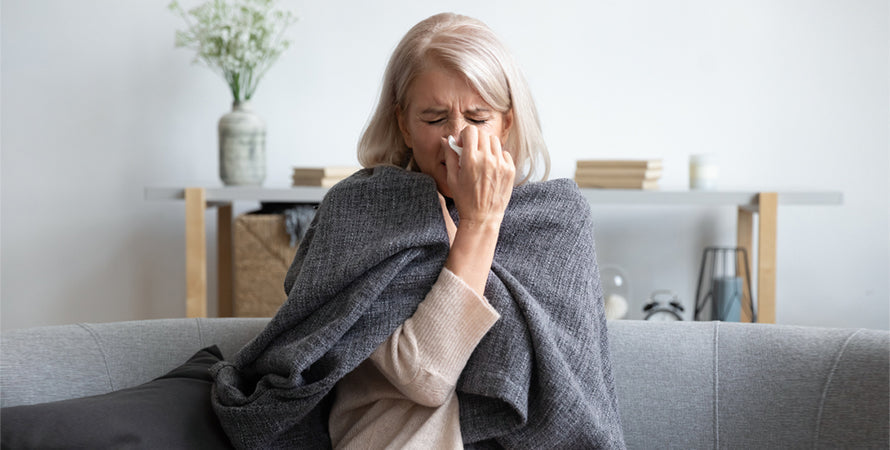During your menopausal transition, it probably feels like everything is changing. Menopause can induce the downregulation of collagen sparking up the question: “Does collagen help with menopause?”.
Research shows skin architecture rapidly changes following menopause due to lowered estrogen levels (17β-estradiol). The average annual decline in skin collagen post-menopause is 2.1%. This plays an integral role in keeping your skin, joints, bones, vaginal structures, hair, and nails healthy. You'll find in this article the relationship between collagen and menopause and natural ways to significantly support collagen depletion so you’re feeling as well as possible.
THE CONNECTION BETWEEN DECLINING OESTROGEN AND COLLAGEN LEVELS
Skin is one of the most negatively affected systems during menopause due to declining oestrogen production by the ovaries. The ovaries, brain, gastrointestinal tract, uterus and vaginal integrity all rely heavily on collagen scaffolding for strength and adaptability. Psychological and sexual changes are predominant during menopause due to vaginal dryness and painful intercourse – this is also a result of changing collagen levels. It’s been shown that post-menopausal women have a significant reduction in collagen types I & III.

COLLAGEN HELPS WITH MENOPAUSE
- Improves skin hydration (great for dry and itchy skin)
- Supports skin dermal layers and extracellular matrix
- Enhances skin elasticity and thickness
- Improves premature or accelerated aging (wrinkles, hyperpigmentation, scarring)
- Is essential for healthy joints, cartilage, bone and ligament health
- Supports healthy vaginal, uterine and digestive tract linings
- Enhances hair and nail growth
- Supports thermal regulation and hot flushes
- Collagen supplements help with menopause by reducing predisposition to collagen atrophy conditions (particularly, vulvovaginal atrophy and pelvic floor disorders)
- May reduce pain during sex (dyspareunia)
COLLAGEN AND VAGINAL HEALTH INTEGRITY
Vulvovaginal atrophy (VVA) is renowned for occurring during menopause with stats ranging from 36% to 90% according to recent surveys. Simply put, hypoestrogenic states flatten the skin's surface, reduce cellular vaginal energy stores and reduce lactobacillus bacterial strands, thus, increasing vaginal pH. This cascade significantly predisposes you to VVA and genitourinary dysregulation. With lowered collagen, your thinning vaginal lining becomes susceptible to trauma, bleeding, ulceration, pain, dryness, and pressure during sex.
Painful sex occurs in around 76% to 78% of menopausal women. The vulva can also experience burning, sensitivity and increased irritability to clothing, sweat and sitting. It’s critical to have sufficient collagen levels to nourish connective tissue, vascular health and elastin content in this life phase. Ensure you have good levels of collagen and menopause symptoms can be relieved.
COLLAGEN TO SUPPORT UTERINE HEALTH
Uterine health relies on many associations you’ve had in your life (e.g. vaginal deliveries, surgeries, underlying infections, smoking, diabetes, etc.). Uterine health and organ prolapses are multifaceted; however, aging and menopause are notable risk factors. Research determines Pelvic Organ Prolapses (POP) have a greater association with low oestrogen and collagen levels. A 2019 study (Dökmeci, 2019) determined women with advanced stages of uterine prolapses had signification changes in genes collagen type I (COL1A) and collagen type III (COL3A).

“Advanced stages of uterine prolapses had signification changes in genes collagen type I (COL1A) and collagen type III (COL3A).“
Lowered oestrogen can gradually slow collagen protein production and cause stiffer connective tissue. Collagen is crucial for a healthy pelvic floor and enhances crosstalk between uterine and pelvic tissues. Vaginal tissue is susceptible to hormonal changes. Women are cyclical beings, thus, our tissues respond differently to hormonal changes. Collagen supplements for menopause can increase collagen protein and support uterine health.
ADRENAL HEALTH CORTISOL AND COLLAGEN DURING MENOPAUSE
During the menopausal transition, oestrogen is shifting predominantly from the ovaries to the adrenal glands (regulatory gland for cortisol). Too much stress will prioritize cortisol over oestrogen and skin regulation. Read more on how stress influences collagen levels.
One 2021 study (Minjung Chae, 2021) investigated the effects of elevated cortisol on collagen type 1 production, gene expression and protein levels. It concluded that cortisol signalling decreases mRNA collagen type 1 sequencing and that collagen peptides recover cortisol-dependent inhibition of collagen production. Pretty fascinating stuff.
Women who are in this stage of life must support collagen production. Here are our top tips to naturally regulate oestrogen and collagen levels:
- Get your daily dose of hydrolysed bioactive collagen peptides (this is why we love Happy Collagen). They can be added to pretty much anything (e.g. coffee, teas, soups, cooking, drinks, smoothies etc.).
- Drink regular organic bone broths and add bone broth to cooking (always have a backup in the freezer). No school like old school!
- Ensure you’re getting enough vitamin C, vitamin D, zinc, vitamin E and protein to support collagen scaffolding and overall antioxidant intake essential for menopause.
- Incorporate 3 phytoestrogen-rich food servings per day (e.g. freshly ground flaxseeds, tempeh, alfalfa sprouts, mung beans, edamame, organic tofu, soy sprouts, tahini, sesame seeds, red kidney beans, chickpeas, hummus, seaweed and buckwheat).
- Avoid antacids as they can significantly impact your collagen-dependent vitamins and minerals like calcium, zinc, magnesium etc.
- Have a source of good-quality protein and omega-3 essential fatty acids with each meal.
During the menopause transition, it's essential to know where to focus your energy and time to nourish your body. Getting sufficient collagen is one of them. As seen in this article, collagen does help with menopause symptoms, so if you’re looking for further collagen-boosting recipes, products, and articles check them out here.










Leave a comment
This site is protected by hCaptcha and the hCaptcha Privacy Policy and Terms of Service apply.